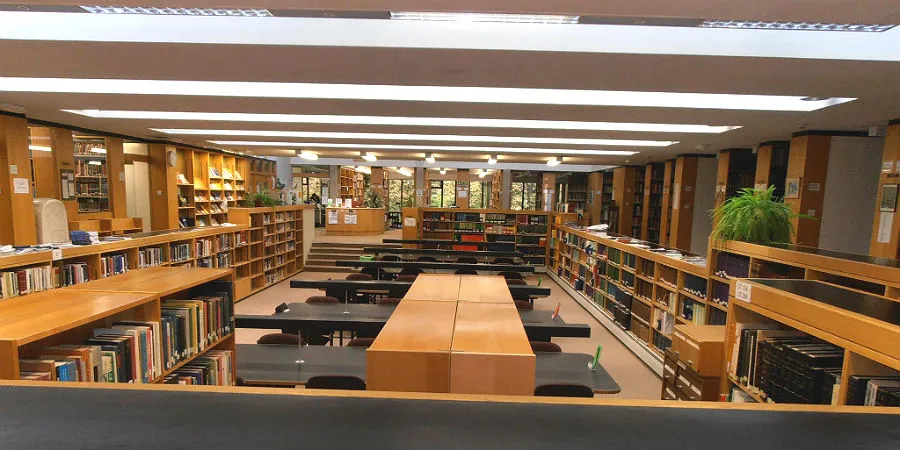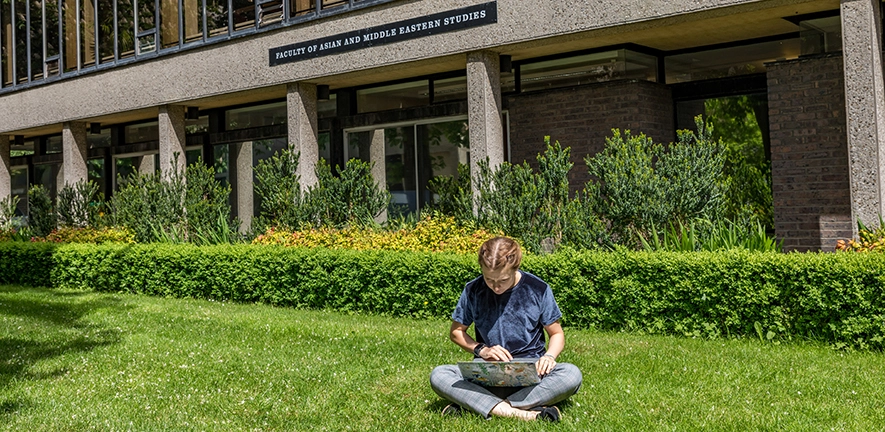Asian and Middle Eastern Studies
Course overview
At Oxford, students can explore Asian and Middle Eastern Studies civilizations beyond the typical Western curriculum. Coming from a conventional background, I was surprised by how enriching it was to learn about Asian and Middle Eastern cultures. The courses immerse you in history, philosophy, art, and more, deepening your understanding of various perspectives. The stunning libraries, like the Bodleian and Nizami Ganjavi Library, housed incredible resources that made my studies come alive. The Ashmolean Museum’s exhibits brought theory to life, while the Griffith Institute Archive sparked a personal connection to ancient archaeology. Plus, the opportunity to study abroad in countries like Japan, Iran, or Turkey makes the learning experience even more meaningful, connecting us to the broader tapestry of global culture and history.

Admissions Requirements
Subject Requirements
Other course Requirements
Admissions statistics
Admissions statistics
- Arabic
- Assyriology
- Chinese
- Egyptology
- Hebrew
- Japanese
- Jewish Studies
- Persian
- Sanskrit
- Turkish
Each year, the Faculty carefully reviews whether it’s safe and appropriate for Persian language students to spend their year abroad in Iran. If travel to Iran isn’t feasible, students are typically placed in alternative locations such as Tajikistan or Armenia.
Occasionally, international study plans may need to be adjusted—for example, if students face visa difficulties or have health conditions that cannot be supported overseas. Students who believe they may be affected are encouraged to contact their department for guidance and support.

Course structure
The options mentioned in this section are for illustrative purposes only. For the most up-to-date and complete list of available choices, please visit the Asian and Middle Eastern Studies website.
Arabic (T601), Persian (T613), Turkish (T600)
| Year 1 | Year 2 | Years 3 and 4 |
|---|---|---|
Courses
|
Courses
|
Courses
|
|
Assessment First University examinations after term 3: three written papers; an oral exam (Arabic only) |
Assessment – |
Assessment Final University examinations at the end of Year 4: oral exam and eight or nine written papers (one of which must be a dissertation) |
Assyriology (Q401), Egyptology (Q400)
Beginning in 2025, the degree title for course Q401 has been updated to BA in Assyriology, replacing the previous title, BA in Egyptology and Ancient Near Eastern Studies. Under this new structure, students focusing on Egyptology will now receive a BA in Egyptology (Q400), while those studying Ancient Near Eastern Studies will be awarded a BA in Assyriology (Q401). The course content and available options remain unchanged.
| Year 1 | Year 2 | Year 3 |
|---|---|---|
Courses
|
Courses
|
Courses
|
|
Assessment First University examinations: four written papers |
Assessment Final University examinations: ten units |
Chinese (T101)
| Year 1 | Year 2 | Years 3 and 4 |
|---|---|---|
Courses
|
Courses
|
Courses
|
|
Assessment First University examinations: three written papers; an oral exam |
Assessment Final University examinations: oral examination; eight written papers (including extended essay for candidates who have taken these options); dissertation |
Hebrew (Q480)
| Year 1 | Year 2 | Years 3 and 4 |
|---|---|---|
Courses
|
Courses
|
Courses
|
|
Assessment First University examinations: four written papers |
Assessment Final University examinations: seven written papers; dissertation; oral examination if taking a year abroad (four-year course) |
Japanese (T201)
| Year 1 | Year 2 | Years 3 and 4 |
|---|---|---|
Courses
|
Courses
|
Courses
|
|
Assessment First University examinations: three written papers |
Assessment Test at the end of the course |
Assessment Final University examinations: oral examination, eight written papers, and dissertation |
Jewish Studies (QV91)
| Year 1 | Year 2 | Year 3 |
|---|---|---|
Courses
|
Courses
|
Courses
|
|
Assessment First University examinations: four written papers |
Assessment Final University examinations: seven written papers; dissertation |
Sanskrit (Q450)
| Year 1 | Year 2 | Year 3 |
|---|---|---|
Courses
|
Courses
|
Courses
|
|
Assessment First University examinations: three written papers |
Assessment Final University examinations: ten papers (seven in Sanskrit, including a dissertation, and three in a subsidiary language) |
Course content and structure may occasionally change due to certain circumstances. For full details, please refer to the information on potential course changes.

Academic requirements
| Qualification | Requirements |
|---|---|
| A-levels | AAA |
| Advanced Highers | AA/AAB |
| International Baccalaureate (IB) | 39 (including core points) with 666 at HL |
| Any other equivalent qualification | View information on other UK qualifications and international qualifications. |
Wherever possible, your academic results are assessed within the context in which they were achieved. Learn more about how we use contextual data in our admissions process.
Subject requirements
Applicants are not expected to have prior experience in Asian or Middle Eastern languages. Nonetheless, possession of language qualifications—such as A-levels, Advanced Higher, IB Higher Level, or their equivalents—can provide valuable preparation and facilitate successful completion of the course, although these are not prerequisites for admission.
If your offer includes any science A-levels with a practical component, successful completion of this element is required. Additionally, applicants whose first language is not English must satisfy our English language proficiency standards.
Proficiency in handwriting Japanese, Chinese, or Korean is essential for these courses. Certain assessments must be completed in handwritten form; alternative methods such as typing will not be accepted.
Applications
All applicants are required to adhere to the application process outlined on our Applying to Oxford pages.
The information below provides specific guidance for candidates applying to this course.
Written work details
You need to submit two pieces of writing, both in English. The topic and the A-level (or equivalent) subject they come from don’t matter—the goal is to show how well you can build an argument and express your ideas in English.
If you don’t have any recent marked work in English (for example, because of the subjects you’re currently studying), you can submit a separate piece, like an essay in English on a topic you’ve studied for your A-level (or equivalent). It’s a good idea to ask your teachers for help in choosing a suitable title. In this case, it’s usually okay if the essay hasn’t been formally marked, since it wasn’t part of your regular coursework.
Submission deadline:
10 November 2025
If you have any questions about what to submit, please get in touch with the Tutor for Admissions at the college reviewing your application. You can find their contact details on our college pages.
What are the tutors looking for?
Learning challenging languages from scratch demands strong motivation and the ability to maintain consistent, well-organized effort.
Studying Asian and Middle Eastern Studies also involves developing skills in analysis, constructing arguments, and essay writing across literature, history, and religious thought.
Careers
The skills gained through a degree in Asian and Middle Eastern Studies are highly valued by a broad spectrum of employers. Career opportunities include:
- finance
- the media
- commerce
- the Civil Service
- the law
- accountancy
- international development
- education
- the arts.
About 30% of Asian and Middle Eastern Studies graduates pursue further study.
Andi, who earned a BA in Japanese, is now the Director of International Business Development at Ping Identity. He says:
“My time at Oxford gave me a strong foundation to meet the diverse challenges of both small and large companies, as well as the skills to adapt to constant change and learning in the software industry. Through my career, I’ve had the chance to do business in Japan on multiple occasions.”
Iason, a BA graduate in Arabic, works as a photojournalist, filmmaker, and lecturer, currently with the UN in Libya. He shares:
“I have lived in Cairo, Damascus, Sanaa, and Tehran, covering major events like the 2011 Arab revolts and the Greek economic crisis. After completing a Master’s in Persian and Contemporary Iranian Studies, I was awarded a Nieman Fellowship at Harvard.”
Fees details
Fee status
|
Annual Course fees
|
|
Home |
£9,535 |
|
Overseas |
£41,130 |
For more information about fee status eligibility, please visit the fee status webpage.
Details on course fees can be found on our course fees page. Please note that fees typically increase each year; for more information, see our guidance on expected fee and charge increases.
Living expenses
Living costs at Oxford may be lower than you expect, thanks to our world-class resources and college support that help keep expenses manageable.
For the academic year starting in 2025, living costs in Oxford are estimated to range between £1,425 and £2,035 per month. Since the academic year consists of three eight-week terms, most students spend around six months in Oxford. However, it’s advisable to budget for nine months to cover holiday periods and other essential expenses. More details are available on the living costs webpage.
Financial support
Home
A tuition fee loan is available from the UK government to cover the full course fees for Home students (including UK and Irish nationals, as well as other eligible students with UK citizens’ rights—see details below*) undertaking their first undergraduate degree**. This means you do not need to pay your course fees upfront.
In 2025, Oxford offers one of the most generous bursary packages among UK universities for Home students with a family income of around £50,000 or less. Additional financial support is available for UK students from households earning £32,500 or less. The UK government also provides living costs support to Home students from the UK and those with settled status who meet residency requirements.
*For courses starting on or after 1 August 2021, the UK government has confirmed that EU, other EEA, and Swiss nationals are eligible for UK student finance if they have UK citizens’ rights—that is, if they hold pre-settled or settled status, or are Irish citizens covered by the Common Travel Area arrangement. The specific support you can receive depends on your residency status.
See further details.
Islands (Channel Islands and Isle of Man)
Students from the Islands are entitled to different support compared to students from the rest of the UK. Please refer to the links below for information about the support available to you from your funding agency:
- States of Jersey
- States of Guernsey
- Isle of Man
Overseas
Please refer to the "Other Scholarships" section of our Oxford Bursaries and Scholarships page.
If you have previously completed an undergraduate degree, you will be classified as an Equivalent or Lower Qualification (ELQ) student and will not be eligible for government or Oxford funding.
Additional Fees
Students studying Arabic, Chinese, Japanese, Persian, or Turkish are required to spend their second year abroad as part of the course. Hebrew students have the option to go abroad, but it is not mandatory.
During the year abroad, students pay reduced tuition fees to the University of Oxford. While fees may vary in future years, to give an example, a Humanities undergraduate going abroad in 2025 would pay approximately:
- £1,430 for UK (Home) students
- £13,985 for Overseas (International) students
(Note: These figures are based on the 2025–26 academic year and may change.)
The Faculty of Asian and Middle Eastern Studies covers language tuition costs abroad, but students must cover their living expenses and travel (flights). Arabic students can choose from several international institutions, although some additional costs may apply depending on the provider. These are shared in advance each year.
Financial support is available through the Turing Scheme, which offers grants for living costs and additional funding for disadvantaged students. Oxford intends to continue applying for Turing funding in future years to support year-abroad study.
UK students can still apply for government student finance to cover living costs, and those from lower-income families who are means-tested remain eligible for Oxford bursaries. Travel grants and extra financial help may also be provided through your college or the University, especially for students with limited financial resources.
The Oxford tutorial
At Oxford, one of the things I appreciated most in my course was the focus on college tutorials—they’re a key part of teaching that sets the university apart. In a typical one-hour tutorial, students like me would sit with tutors, who were often active in research in the same subject, and explore a topic in great detail. Unlike traditional lectures, classes, or even lab work and fieldwork, these in-depth sessions gave us personalised attention that few other universities offer. We’d come with prepared work, often joined by one or two others studying the same subject, and the tutor would track our progress, offering extra help when needed. It made me learn more effectively, especially in complex areas of Asian and Middle Eastern Studies, where discussion truly brings ideas to life.
College life
Our colleges are at the heart of Oxford’s reputation as one of the best universities in the world.
- At Oxford, every student becomes a member not only of their academic department but also of a college—an integral part of the University’s distinctive collegiate system. This dual affiliation offers students the unique advantage of belonging to a globally renowned institution while enjoying the personal support and community spirit of a smaller academic environment. Each college comprises dedicated academic and support staff, as well as a diverse student body, fostering a safe, inclusive space where individuals can excel academically, build meaningful connections, and explore a wealth of extracurricular opportunities.
- While each college has its own unique identity and traditions, the core facilities provided are broadly similar across the University. Regardless of size or location, every college is equipped with essential amenities designed to support students throughout their academic journey and daily life.
- Porters’ lodge (a staffed entrance and reception)
- Dining hall
- Lending library (often open 24/7 in term time)
- Student accommodation
- Tutors’ teaching rooms
- Chapel and/or music rooms
- Laundry
- Green spaces
- Common room (known as the JCR).
- All first-year students at Oxford are guaranteed accommodation arranged by their college, either on the main college site or within a nearby annexe. This ensures that your neighbours will also be new students—fellow freshers beginning their Oxford journey—helping create a supportive and welcoming environment from day one. There’s no need to worry about arranging housing before you arrive; everything is organised in advance as part of your admission experience.
- Most colleges offer accommodation beyond the first year, with many providing housing options for two or more years, and some for the full duration of your degree. You may choose to remain in college accommodation throughout your time at Oxford or opt to live independently after your first year, perhaps with friends from other colleges.
- While college tutors are primarily focused on your academic progress, they are also available to offer broader advice and support. In addition, colleges have dedicated welfare staff who help students settle in and can provide guidance on practical matters, personal wellbeing, or health-related concerns. Peer support is also a valued part of college life—senior students often help those in earlier years, either informally or as part of a college ‘family’ or as trained peer supporters through the University’s Counselling Service.
